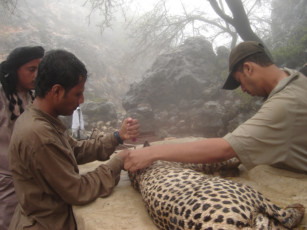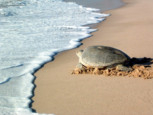
Muscat: Oman is successfully taking its battle of conservation to the poachers and result has been encouraging.
“We are tightening screws against hunters as well as poachers, who harm natural resources with their illegal activities,” Mohammad Bin Juma Al Sharyani, Deputy Director of Nature Conservation, told Gulf News.
He pointed out that so far Oman has identified 15 nature reserves and the process is on to identify three or more protected areas.
“We have also appointed 263 rangers across the country to tighten vigil over illegal poaching, hunting or even fishing,” he said, adding that the rangers are spread over 41 units in different parts of the country.
Last year 122 cases were registered against poachers/ hunters but in the first six months of this year it has jumped to 85. “We look at it the other way,” explained Al Sharyani. He added that the increased vigilance across the country has also resulted in more attempts at poaching and hunting coming to light.
“We are confident that the ‘such incidents’ have come down as our watchfulness increases against violators.”
He further said that they were aiming to reduce human impact that could affect the environment, flora and fauna in the country.
“We are now restricting entries to protected areas and only permit holders are allowed to enter these areas,” he said, adding that the Environment Ministry has decided to restrict number of visitors per day to protected areas like turtle nesting beaches, the Jebel Samhan Nature Reserve in Dhofar region, Damaniyat islands and other reserves.
“From the month of May to October we do not allow human entry into Damaniyat Island,” he revealed. The Damniyat Islands are a very popular tourist place, especially for those keen on bird watching and coral reef.
He clarified that visitors coming from GCC states can get permit on the spot as trained rangers have authority to issue such permits.
Talking about the impact on animal population in the country, he said: “The low rainfall in the last ten years and desertification has had its impact on the population of animals in the country.”
“Also, he added, “hunting affects the population, especially that of gazelle, rabbits and Arabian Ibex.”
“The hunters target gazelle, rabbits and Ibex as they are much in demand for human consumption,” reckons Al Sharyani.
Talking about action against hunters and poachers, the senior environment ministry official said that mostly the ministry settles such cases by slapping fines on those caught in the act. “There have been some cases where we have to approach the court,” he agreed without elaborating on those cases.
Meanwhile, Ahmad Bin Saeed Al Makhamani, Director of Protected Areas at the Ministry of Environment and Climate Affairs, told Gulf News that presently only 2.582 per cent of area in the country was reserved.
“We are planning to increase protected areas to 10 per cent of the country’s total area (approximately 309,501 km),” the environmentalist pledged.
He revealed that the ministry rangers had observed 546 different species of bird in the country so far. “Some are resident birds and some are migratory,” he noted.
He also said that the country had as many as 253 species of coral and 93 reptiles.
Talking about turtles, he said that around 13,000 turtles visit Oman in a year. “We have rare green turtles coming to Masirah islands for hatching,” pointed out Al Sharyani. He also said that the researchers believe that some of the turtles that hatched at Oman’s beaches have returned as adults after around 30 years.
“The turtles keep increasing each year and we have a very good programme in place to protect them from poachers,” he said.
However, Al Makhamani agreed that there have been attempts, some successful, in stealing turtle eggs.
The officials agree that poachers try newer methods but environmentalist in the country get innovative to counter their attempts to preserve flora and fauna.
Captions
A greenback turtle at a beach in Oman
Rangers during a survey on leopard in the Jebel Samhan Nature Reserve in Dhofar region.
The ammunition caught from hunters
Supplied Pictures













